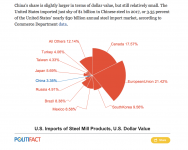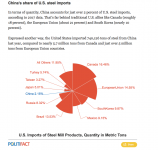Government's have always spoken to their internal audiences, particularly when you look at US elections held during the 1812-1945 period, so this is nothing new, nor is populism. A reduction in Chinese access to the US market will not stir manufacturing, only move it from China to somewhere else as the reality is that the US consumer wants to go to Walmart and buy a shirt for $10. This can't be done in the US or Canada, which is why these jobs moved oversees (same as during the 1800's). It also assumes that the US market can rely internally on itself, which isn't the case, and that the US manufacturing industry could convince other western nations to "buy US" instead of purchasing the goods from China for far less. In the "good old days" the US pines for, there was also the reality that the major industrial powers had spent 6 years bombing each other and couldn't produce items locally and that the US was flush with money due to war loans to the UK (sort of like China is today with war loans from the US). These factors don't exist anymore.
Trump's biggest challenge is, in fact, Trump.
If he can bump manufacturing even by 5-10%, he will be looked at kindly. China's goal was to make the world beholden to them through economic means and military. A trade war is a much bigger threat to them, than they would admit. China's history has been that of expansion and collapse due to internal factors. There are a lot of internal factors that the government barely controls as it is. If the economy drops enough, then Xi's support base will collapse quickly and the knives will come out. The party will remain, but the head would be different.




